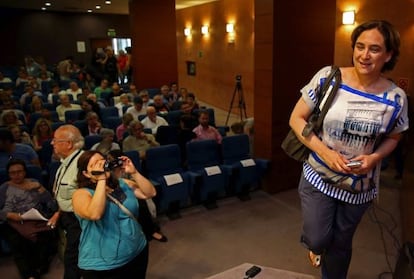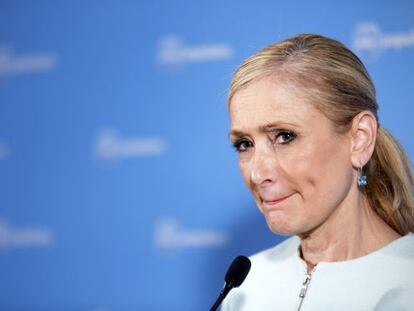Ada Colau resists ERC demands to sign up to Catalan independence plan
Likely next Barcelona mayor refuses to accept party’s condition for support in council Podemos and Socialist leaders set for first meeting as investiture deadline looms

With just a few days left before local and regional leaders are sworn into office across Spain, party chiefs are battling to forge investiture deals in the highly fragmented political scenario that emerged from the May 24 elections.
Social activist-turned-politician Ada Colau, whose leftist coalition Barcelona en Comú (BComú) secured one more council seat than the incumbent CiU nationalist bloc in the city’s municipal elections, said that she would not be joining Catalonia’s pro-sovereignty drive despite entreaties by the Catalan Republican Left (ERC), which sees this as a condition for political deals in the council.
The likely next Barcelona mayor said her group would “not be an obstacle, but an ally” when it came to the right to decide on independence in the region, but that it would not “sign up to roadmaps that are inappropriate to us.”
Podemos has the enormous opportunity to be aware that Spaniards have asked for reform”
Socialist leader Pedro Sánchez
Colau said negotiations with the ERC and the Catalan Socialists (PSC) over support in City Hall would continue. BComú obtained 11 councilors in the elections, while the ERC won five and the PSC four. If they can all come together, it would give Colau a total of 20 councilors in a council made up of 41 seats, but where the higher worth of the mayor’s vote would be sufficient to break any deadlock.
Meanwhile, Socialist Party secretary general Pedro Sánchez and Podemos leader Pablo Iglesias were due to hold their first face-to-face meeting on Wednesday evening.
Although they campaigned as rivals for the leftist vote, often exchanging derogatory remarks about one another, both parties now find that they need to band together in order to keep the conservative Popular Party (PP) from power in many regions and municipalities.
Both politicians have stated that their priority right now is throwing out the PP, which lost significant voter support yet managed to narrowly win in many constituencies. In the city of Madrid, an alliance of Socialists and the Podemos-backed Ahora Madrid coalition could keep PP nominee Esperanza Aguirre from occupying the mayor’s office.

But while Iglesias says he wants the Socialists to “do a U-turn” on corruption issues, transparency and social policy, Sánchez asserts that his party will not change.
“Podemos has the enormous opportunity to be aware that Spaniards have asked for reform,” said Sánchez in a press conference on Wednesday. “If they support reform and not rupture, then the Socialist Party can get along with it.”
Earlier in the day, Sánchez met with Prime Minister Mariano Rajoy, of the PP, to discuss the political situation following the municipal and regional ballots, which are due to be followed by general elections in the fall.
The Socialist leader told Rajoy that Spaniards want to see immediate changes, and that much can be achieved before they return to the polls later this year. But it is unlikely that his ideas for reindustrialization, social policies and democratic regeneration will receive much support from Rajoy, who still has a majority in Congress.
Meanwhile, on Tuesday, Rajoy met with Albert Rivera, head of emerging party Ciudadanos, whose support is crucial if the PP is to retain control over the Madrid regional assembly. Rivera has also met with Socialist leader Sánchez, and has stated that he is ready to help either major party as long as it accepts Ciudadanos’ anti-corruption measures.
However, no meeting is expected between Rajoy and Podemos leader Pablo Iglesias.
Tu suscripción se está usando en otro dispositivo
¿Quieres añadir otro usuario a tu suscripción?
Si continúas leyendo en este dispositivo, no se podrá leer en el otro.
FlechaTu suscripción se está usando en otro dispositivo y solo puedes acceder a EL PAÍS desde un dispositivo a la vez.
Si quieres compartir tu cuenta, cambia tu suscripción a la modalidad Premium, así podrás añadir otro usuario. Cada uno accederá con su propia cuenta de email, lo que os permitirá personalizar vuestra experiencia en EL PAÍS.
En el caso de no saber quién está usando tu cuenta, te recomendamos cambiar tu contraseña aquí.
Si decides continuar compartiendo tu cuenta, este mensaje se mostrará en tu dispositivo y en el de la otra persona que está usando tu cuenta de forma indefinida, afectando a tu experiencia de lectura. Puedes consultar aquí los términos y condiciones de la suscripción digital.









































